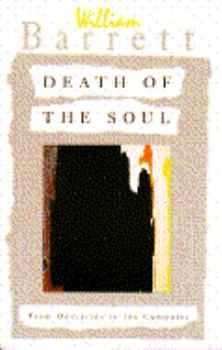Death of the Soul
Select Format
Select Condition 
Book Overview
The author examines the diminishing place of the spirit in philosophical thought from Descartes to the present day, and demonstrates that the ever more pervasive influence of scientific materialism... This description may be from another edition of this product.
Format:Paperback
Language:English
ISBN:038517327X
ISBN13:9780385173278
Release Date:March 1987
Publisher:Anchor Books
Length:173 Pages
Weight:0.54 lbs.
Dimensions:0.6" x 5.2" x 7.9"
Customer Reviews
3 ratings
Neat little book!
Published by Thriftbooks.com User , 23 years ago
At first glance, it seems like science fiction: can human programmers create a computer that could exceed human capacity to think? But as the question is presented in this book, the question is not a matter of how far computer technology will go, but is a matter of how tenuously human consciousness has held up in comparison, after the wake of a scientific revolution dating back to the 17th century. Beginning with Descartes and ending with early 20th century logical positivism, Barrett outlines the development of the major philosophers and their theories of mind.In an era where scientific materialism reigned and we began discovering (even before Einstein) that there was little reason to believe in an absolute fixity in the cosmos, the idealism and metaphysics of the ancient philsophers melted away. Once we were wrenched from the belief that the idea of good can be deducted from nature, it became more and more difficult to put together a theory of how the mind organizes the sense data (if we can at all) and, more importantly, come to any conclusion about what we can say about our conscious self. If, as David Hume would suggest, we can't be certain of consistent sense data from one moment of perception to the next, how are we to say anything about the capacity for us to put back together "the dissipating self"?While it may require a little bit of familiarity with the philosophers, Barrett's conversational style of prose and precise focus keep the reader from getting lost. Although the book came out in the mid-80s, the expansion in computer technology since then has only heightened the question of how intelligent we can program a machine, and how stunted our growth may be in comparison, in finding the conscious "glue" to put together an integrated sense of self-identity.
WOW
Published by Thriftbooks.com User , 25 years ago
I realy Realy need a copy of this book. The last time I read this in a class, was the last time my teacher was alive and no one else is teaching it. So, I've been looking all over Montreal, Canada for this book and I can't find it. I was too dumb then to buy it. Now I regret! it!
excellent intro to philosophy & its place in modern society
Published by Thriftbooks.com User , 25 years ago
Somebody needs to go pound on the publisher's door to get this back in stock or in print. I took a class in the Philosophy of Technology putting this and Ellul's _The Technological Society_ together, and it really redefined the way I view technology, especially as modern America values it. Barrett takes you through the residual effects of Cartesian thinking in the implicit scientific materialist philosophy that most Americans inherit; written with both a balanced mind and a passion for philosophy. And if that's not enough, or doesn't make sense, it's just a damn fine intro to philosophy that's not hard to read (if you're by any chance teaching a class and need to introduce Descartes and Kant, this is your book). Also reccomend Ellul, above, and Barrett's _Irrational Man_, a treatise on Existential philosophy with a similar tone.






